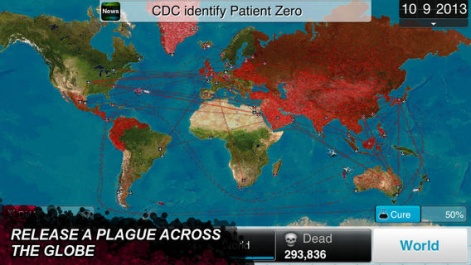This is a guest column from early stage games investor LVP.
It is currently invested in companies such as Unity, Coda Games, Double Loop Games, and Bossa Studios, and recently closed an $80 million fund for new investments.
It has also invested and exited from companies such as Supercell, NaturalMotion and Playfish.
Gaming as a safe haven shouldn't be a surprise in a topsy-turvy world in which T-bonds and Texas oil are being given away for free, tens of millions of workers have been laid off overnight, governments are paying the salaries of tens of millions more, and the retail, tourism, and leisure economies have imploded.
Cheap, social, immediate, and extending almost infinitely in terms of the time that can be soaked up, gaming has once again demonstrated its inherent ability to provide a comfort blanket in an era of economic and existential stress.
When you've binged out all the box sets you hadn't managed to fit into your previously busy schedule, where else is there to spend high quality self-isolation time than engrossed in your gaming platform of choice?
Where are gaming's unknown unknowns in the era of Covid-19?
Despite the unusual circumstances, our explicit assumption that games are recession-proof is yet to receive a counterfactual.
- The stock of the big three US games companies — Activision Blizzard, EA and Take Two — has risen by around 10 percent since the start of March. In contrast, the Nasdaq is down 8 percent.
- Having doubled year-on-year sales and also prepping its supply chain for increased Switch production, Nintendo's shares are up 20 percent over the same period.
- The current console cycle is ending, with new hardware due later in the year, but both PlayStation 4 and Xbox One sales rose by 25% during March in the US.
- Monthly digital software sales hit an all-time high in March of $10 billion.
- Even the sales of gamepads are up, underlining the value of friends and families playing together, whether self-isolated or socially-distant.
This is one of the reasons LVP only ever invests in the games ecosystem.
Anything new?
Yet, in this context, as an early stage investor in game companies, it is inappropriate to ask, will gaming have its Tiger King moment?
Put another way: will we see the rise of new, striking experiences; surprisingly new validations of gaming's value, both commercially and societally? In other words, where are gaming's unknown unknowns in the era of Covid-19?
Despite all the talk of this period as being a significant inflection point for many industries, it's not immediately obvious that the global restrictions placed on the daily lives and movement of billions of people have impacted games in particularly different ways than anyone would have expected.
Steam and CS:GO have hit all-time highs. Plague, Inc. is back atop the paid mobile game chart, Words With Friends' engagement is through the roof. The latest versions of Animal Crossing and Call of Duty are doing better than ever. How could these things not be so?

A rising tide isn't floating all boats equally or creating new opportunities for all, though. Success is never equally distributed. Analysis from Adjust — while pointing to a 75% increase in mobile game installs and a 47% jump in sessions quarter-on-quarter — reported "little evidence of a fundamental shift in user behavior post-install", with Newzoo similarly finding Covid-19 having merely accelerated existing trends.
Interestingly, ironSource contextualised the change in mobile gaming consumption as being broadly equivalent to every day having the same amount of gaming as a normal weekend would. Because if you're stuck at home not working, every day has the same amount of free time as a weekend would.
And this freedom appears to be impacting different game types in different ways. Downward pressure on the cost of gaining users via advertising combined with an uplift in downloads is driving a feeding frenzy for hypercasual mobile games.
A rising tide isn't floating all boats equally or creating new opportunities for all, though. Success is never equally distributed.
It's not clear, however, if the same is true for midcore mobile games, which rely on a deep predictive understanding of their users to attract a small handful of very big spenders who account for a disproportionate amount of overall revenue.
Indeed, one commentator suggests that viewed through the lens of being a luxury good, in the coming months, heavy IAP spending from this cohort could be vulnerable to the same recessionary pressures as, say, a $50,000 alligator skin Birkin handbag.
Better together
If there is one edge case to shake up the future, though, it's how gaming is playing out across our physically distanced communities. As everyone hopes: "We might not be so close, but we are more together".
The most unusual headlines in this regard have been generated by Epic's Houseparty social gaming app. Generating 50 million downloads in March, it even became newsworthy enough to trigger a mysterious, mixed-up tale concerning users' online security, marketing black arts, and a $1 million reward for evidence linking the two.
Of course, the explosive rise of social gaming apps which enable distanced friends to interact together isn't itself a surprise.
As we discussed in our article on esports, community and competition has been a growing trend in gaming over recent years, with even very casual gaming experiences adding guild and related features to improve retention and/or monetisation.
That’s why it's no accident many of the companies LVP has recently invested in have a strong community and social bias.

Most directly is the case of Bunch, a video chat app for multiplayer games. Driven by network effects, by-the-numbers it's experienced a 50-fold growth in the number of total sessions and a rise of 75 percent in daily number of sessions during March.
But, in terms of how Bunch is now being used, its user base has shifted from North American males to predominately international and female, with a corresponding shift in the time spent gaming and chatting, rather than just chatting.
The context of gaming clearly makes the experience of chatting better. And we believe it's this sort of behavioural shift that will have a lasting legacy.
Changes
Indeed, many of our portfolio companies were already positioned to make the most of what — Covid-19 or not — we believe will be an accelerating demand for the many flavours of gaming together.
Whether that’s BetaDwarf’s "friendshipping" games; Vela Games' MOCO (multiplayer online co-op) games; or Singularity 6’s "games where you really belong", our thesis has always been games are best (and more valuable), the more they build community and the deeper the ties that bind those gamers to each other.
Covid-19 has disrupted the lives of billions of people globally. No doubt, its repercussions will be experienced for the months and years to come.
It's been fantastic to see gaming companies coming together to promote public health with programs such as #PlayApartTogether, as well as the many charitable gifts and initiatives individual game companies and communities have provided.
For gaming will always be there, providing new, increasingly accessible, exciting and positive experiences for everyone. That may not be as striking as Joe Exotic's peroxided mullet, but it is infinitely more important.
For more about LVP, visit londonvp.com and check out its Medium.





















